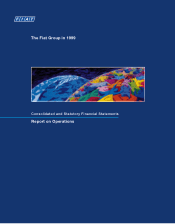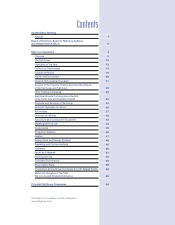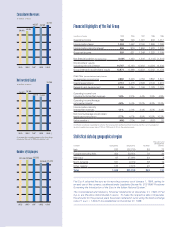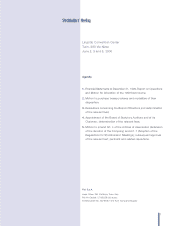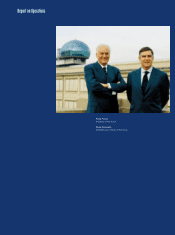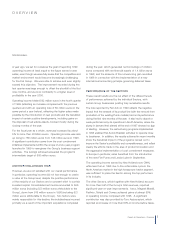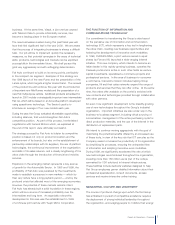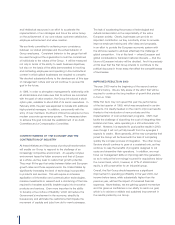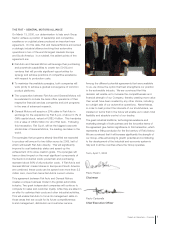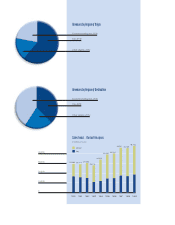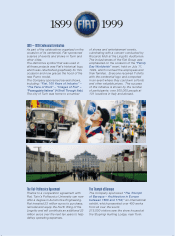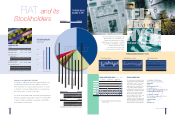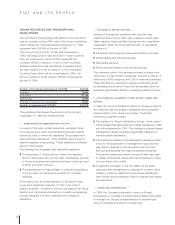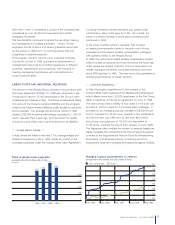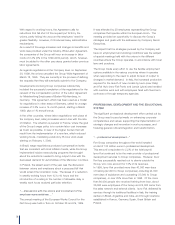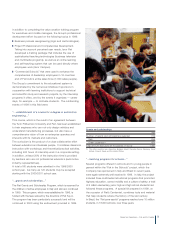Chrysler 1999 Annual Report Download - page 10
Download and view the complete annual report
Please find page 10 of the 1999 Chrysler annual report below. You can navigate through the pages in the report by either clicking on the pages listed below, or by using the keyword search tool below to find specific information within the annual report.
8
and intellectual resources in an effort to accelerate the
implementation of our strategies and focus the entire Group
on the achievement of our core values: customer satisfaction,
employee enhancement and value creation.
We are firmly committed to achieving more consistency
between our stated principles and the actual behavior of
Group employees. Consistent behavior is the gauge that will
be used throughout the organization to test the commitment
of individuals to the values of the Group. It will be measured
not only in terms of the ability to reach business objectives,
but also on the basis of the skills demonstrated in involving
and motivating employees and operating in the multicultural
context in which global businesses are required to compete.
We devoted substantial efforts to the development of this type
of management culture and we will continue to pursue this
goal in the future.
In 1999, in order to strengthen management’s relationship with
all stockholders and make sure that its actions are consistent
with the goal of value creation, the Group introduced a stock
option plan, available to about 650 of its senior executives. In
February 2000, the plan was expanded to include 200 additional
high-potential managers. In addition, concurrently with the
entry of new members, the Board of Directors adopted a more
modern corporate governance system. The measures taken
to achieve this goal included the establishment of an Audit
Committee and a Compensation Committee.
COMPETITIVENESS OF THE ECONOMY AND THE
CONTRIBUTION OF INDUSTRY
All these initiatives and this process of profound transformation
will enable our Group to respond to the challenge of an
increasingly competitive environment. An equally complex
environment faces the Italian economy and that of Europe
as a whole, as they seek to realize their growth potential.
They must fill the gap that exists between Italian and European
growth rates and those experienced in the United States by
significantly increasing the level of technology incorporated
in products and services. This will require an intensive
application of information and communication technologies,
massive investments in research and a shortening of the time
required to translate scientific breakthroughs into innovative
products and services. Even more important is the ability
to develop a true culture of flexibility, which will reduce the
Government’s involvement in the economy, simplify its
bureaucracy and eliminate the restrictions that impede the
movement of capitals and jobs from old to new businesses.
The task of accelerating the process of technological and
cultural modernization is the responsibility of the entire
European society. Clearly, businesses can provide an
important contribution, as they constantly strive to innovate,
improve employee training and offer ideas and proposals,
in an effort to provide the European economic system with
the stimulus needed to address effectively the challenge of
global competition. It is at this level — where European and
global considerations transcend national interests — that the
future of European industry will be decided. And it is precisely
at this level that the Fiat Group intends to contribute to the
political discourse in those areas that affect the competitiveness
of businesses.
IMPROVED RESULTS IN 2000
The year 2000 marks the beginning of the second century
of Fiat’s history. We are fully aware of the effort that will be
required to continue the long tradition of growth that started
in Turin in 1899.
While Fiat Auto may not repeat this year the performance
of the last quarter of 1999, which was exceptional in certain
respects, it is clearly headed on the road to improved results,
thanks to the introduction of new products and the
implementation of cost containment programs. CNH must
tackle the challenge of absorbing the cost of integrating New
Holland and Case, while operating in a still unfavorable U.S.
market. However, it is expected to post positive results in 2000,
even though it will not yet fully benefit from the synergies it
expects to create. More generally, all the new companies that
joined the Group will be faced with the task of completing
quickly the complex process of integration. The other Group
Sectors should continue to grow at a sustained rate, as they
continue to reap the benefits of programs designed to cut
costs and streamline their operations. In addition, we must
focus our management skills on improving cash flow generation,
so as to reduce the borrowings incurred for acquisitions below
the current level, which, however, at 27% of stockholders’
equity, is still conservative for an industrial group.
Overall, the Fiat Group should experience a significant
improvement in operating profitability in the year 2000, but
income before taxes, while substantially higher than the
previous year, will feel the impact of increased financial
expenses. Nevertheless, we are gaining upward momentum
and this gives us confidence in our ability to reach our goal,
which is to achieve a reliable and sustained improvement in
the results posted by our Group.

